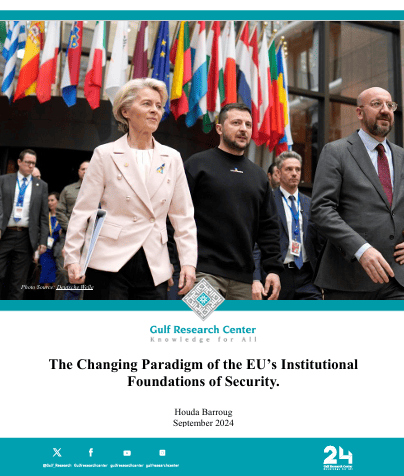Select any text and click on the icon to listen! ByGSpeech
ByGSpeech
 ByGSpeech
ByGSpeech ByGSpeech
ByGSpeech
It has become evident that Europe is grappling with an unprecedented security crisis. On the one hand, the ongoing Russian war on Ukraine and the human rights violations in Gaza have exposed both the deep divisions and hypocrisy of EU governments, bringing into light the fragility of consensus and a trend towards fragmentation among policymakers. On the other hand, the renaissance of far-right political movements further complicates the domestic landscape of Europe, bringing into question the foundational principles that the EU was built on, namely those of unity, cooperation, and the one-way ticket away from fascism.
The impending US elections present two divergent paths for EU security and transatlantic relationships that will further impact European security. If Donald Trump wins, American disengagement will exacerbate existing concerns on the EU side. Trump’s transactional approach to international alliances and focus on “America First” are nothing new to EU officials or security mechanisms. Another Trump election would foist a reassessment of EU defense strategies, which would include an increase in military spending amidst a reduction in security guarantees from the US.
Although the election of Kamala Harris might not mark a radical shift in transnational cooperation rhetoric, changes and challenges to European security would be inevitable. Her unwavering commitment to NATO and other international institutions restores a sense of tranquility amongst the EU nations; her shared commitment to international cooperation against global threats that have made a direct impact on European security is warmly welcomed. But in her own words, “this is the one- the most existential, consequential, and important election of our lifetime.” Despite the outcome of the election, structural changes are underway.
Harris’s views align with the majority of EU policymakers, but the challenges facing the US are also unprecedentedly complex, making an eventual “America First” approach in her foreign policy inevitable. This has already been the case with President Joe Biden whose engagement with the transatlantic partnership was characterized by a semi-religious dogma- more pragmatically than ideologically. This departure from the post-Cold war alliance with the EU should be expected to continue if Harris, who seeks to branch out and nourish new partnerships with Asian and Latin American governments, is elected. In forging these new partnerships, the EU would eventually be sidelined, requiring it to develop its own security mechanisms. Whether it is the prospect of a departure or that of continued but less US direct engagement, the EU has to effectively, and urgently, work on its strategic autonomy.
The “European Defense Industry Program” showcases Europe's ambition to forge itself a new role in defense matters, especially those related to the competitiveness of the industry. It highlights the need for initiatives on the EU level to increase joint production and collaboration, create relevant institutional frameworks, increase defense spending, and support export capacity. The overall aim is to achieve a long-term, sustainable Europeanisation of the Union's defense mechanisms and scale up the industry to sustain the needs of European security.
The Program also presents an opportunity to reform the EU’s internal mechanisms. The Parliament’s long reliance on middlemen in defense procurement has led to inefficiencies and fragmentation, challenging its legitimacy and credibility. It aims to clarify the EU’s roles and responsibilities, enhancing its commitment to scaling up European security. Moreover, the reluctance of member states to actively engage with the defense subcommittee undermines oversight within the Parliament defense framework and policymaking, which is why the Program aims to enhance the operational efficacy and strategic coherence of EU defense activities.
The Program, while ambitious, faces various challenges. The decades-long fragmentation amongst EU parliaments, the national economic and political barriers of member states, and the reliance on US securitization have significantly impacted the ability of EU institutions to reach a consensus on security in the region--both in theory and practice. Consequently, EU governments are not only forced to rethink their approach but also their understanding of collective security. Otherwise, the concept of security will continue to be ambiguous in EU dictionaries, and the goal of a secure Europe will remain far-fetched.
The EU structural institutional framework is well aware of these challenges and is in the process of reshaping its defense policy and bolstering its own security framework. Promoting dialogue and cross-institutional collaboration on security issues remains critical in enhancing the Union’s collective response to security threats. Moreover, increasing defense expenses should be coupled with public support for defense initiatives, which is why articulating a long-term vision for European security also requires increased funding to meet the domestic socio-economic needs of member states.
Houda Barroug is a Researcher Gulf Research Center Foundation, Brussels